When you are married to a narcissistic husband, one of the most crucial concerns is protecting your child from the negative impact of his behavior. Dealing with a narcissistic father can be challenging and emotionally draining, but there are strategies you can employ to safeguard your child’s well-being.
In this article, we will explore effective ways to protect your child from a narcissistic father, offering practical advice and valuable insights.
Understanding Narcissism: Unmasking the Traits
To effectively protect your child, it is essential to understand narcissism and its traits. A narcissistic father often displays an exaggerated sense of self-importance, a constant need for admiration, and a lack of empathy. By familiarizing yourself with these traits, you can better recognize their impact on your child’s well-being.
Narcissism often leads to emotional manipulation, exploitation, and an unhealthy focus on the self. By understanding these dynamics, you can develop strategies to shield your child from their negative effects.
Recognizing the Impact on Your Child’s Development
Growing up with a narcissistic father can significantly impact your child’s emotional and psychological development. It may lead to low self-esteem, anxiety, depression, and difficulties in forming healthy relationships. By recognizing these effects, you can take proactive steps to counteract them and support your child’s growth.
Strategies To Protect Your Child from a Narcissistic Father

Here are strategies to protect your child from a narcissistic father:
1. Creating a Safe and Supportive Environment
A crucial aspect of protecting your child from a narcissistic father is creating a safe and supportive environment at home. Ensure your child feels loved, valued, and heard. Encourage open communication and provide a nurturing atmosphere where they can express their feelings without judgment.
2. Setting Boundaries: Establishing Clear Guidelines
Setting boundaries is vital when dealing with a narcissistic father. Establish clear guidelines for acceptable behavior and communicate them consistently. This helps protect your child from manipulation and ensures a stable environment.
Key Points:
- Clearly define rules and expectations for your child’s well-being.
- Maintain consistency in enforcing boundaries.
- Be firm in your stance and resist manipulation.
3. Communicating with Your Child about Narcissism
Openly discussing narcissism with your child can be empowering. Provide age-appropriate explanations about their father’s behavior, emphasizing that it is not their fault.
Encourage them to express their emotions and validate their experiences. By fostering honest conversations, you help your child understand and cope with the situation.
4. Empowering Your Child: Building Self-Esteem and Resilience
Building your child’s self-esteem and resilience is essential in protecting them from the negative influence of a narcissistic father.
Encourage their talents and interests, celebrate their achievements, and provide a nurturing environment where they can develop a strong sense of self-worth.
Key Points:
- Encourage your child’s passions and interests.
- Praise their efforts and achievements.
- Foster a resilient mindset by teaching problem-solving skills.
5. Co-Parenting Strategies: Navigating Difficult Situations
Navigating co-parenting with a narcissistic father requires careful planning and strategy. Document all interactions, maintain clear lines of communication, and involve professionals when necessary. Focus on the well-being of your child and prioritize their needs above all else.
Key Points:
- Keep communication with your ex-partner concise and focused on child-related matters.
- Document incidents and keep a record of any concerning behavior.
- Seek professional help, such as family therapy or mediation, if necessary.
6. Seeking Professional Help: Therapy and Counseling Options
Professional therapy and counseling can be invaluable resources in protecting your child from a narcissistic father. Consider individual therapy for your child, as well as family therapy to address any ongoing issues.
A qualified therapist can guide you and your child through the healing process and provide tools for coping with the challenges you face.
7. Documenting Incidents: Protecting Your Rights and Your Child’s
Documenting incidents involving your child’s interaction with their narcissistic father is essential for legal purposes. Maintain a detailed record of any concerning behavior, including dates, times, and descriptions of events. This documentation can support your case if legal action becomes necessary in the future.
8. Understanding the Legal Implications: Custody and Visitation
Understanding the legal implications of dealing with a narcissistic father is crucial for protecting your child’s well-being. Familiarize yourself with custody laws and consult with an experienced family law attorney if needed.
By understanding your rights and options, you can make informed decisions that prioritize your child’s safety and best interests.
Frequently Asked Questions
How can I protect my child from the negative influence of a narcissistic father?
How do I explain narcissism to my child without blaming their father?
What legal steps can I take to protect my child from a narcissistic father?
Can therapy help my child cope with the effects of a narcissistic father?
Where can I find support as a wife dealing with a narcissistic husband?
Remember, your child’s well-being is paramount. By implementing these strategies and seeking appropriate support, you can protect your child and help them grow into resilient, confident individuals.
Last words on How to Protect Your Child from a Narcissistic Father
Protecting your child from a narcissistic father is a challenging journey, but with the right strategies, support, and resources, you can ensure their well-being.
By understanding narcissism, creating a safe environment, setting boundaries, and seeking professional help when necessary, you empower yourself and your child to thrive despite the challenges. Remember, you are not alone, and there is support available to help you navigate this difficult situation.

Hi, thanks for the information. I would however like to know if the information would be the same regarding protecting a child from a narcissistic mother?